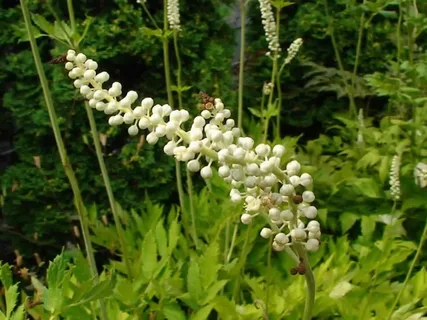Black cohosh, scientifically known as Actaea racemosa or Cimicifuga racemosa, is a perennial herb native to North America. It has a long history of traditional use among indigenous peoples for various medicinal purposes. In recent years, black cohosh has gained popularity as a dietary supplement primarily used by women for its potential benefits in managing menopausal symptoms. In this comprehensive guide, we’ll explore the benefits, dosage, side effects, and more of black cohosh.
Traditional Uses and History
Black cohosh has been used for centuries by Native American tribes, including the Cherokee, Iroquois, and Algonquin, for its medicinal properties. Traditionally, it was used to alleviate menstrual cramps, promote childbirth, and relieve symptoms associated with menopause, such as hot flashes, mood swings, and sleep disturbances.
Active Compounds and Mechanism of Action
The medicinal properties of black cohosh are attributed to its bioactive compounds, including triterpene glycosides, such as actein and cimicifugoside, and phenolic compounds, such as caffeic acid derivatives. These compounds are believed to exert their effects by interacting with neurotransmitter receptors and modulating hormonal activity, particularly estrogenic activity, in the body.
Benefits of Black Cohosh
Black cohosh is primarily known for its potential benefits in managing menopausal symptoms, including
Hot Flashes
Several studies suggest that black cohosh may help reduce the frequency and severity of hot flashes, a common symptom experienced by women during menopause.
Night Sweats
Black cohosh has been reported to alleviate night sweats, another common symptom associated with menopause.
Mood Swings
Some research suggests that black cohosh may have mood-stabilizing effects, helping to improve mood and reduce irritability and anxiety during menopause.
Bone Health
There is some evidence to suggest that black cohosh may help support bone health and reduce the risk of osteoporosis, although more research is needed to confirm these effects.
Dosage and Administration
The appropriate dosage of black cohosh can vary depending on factors such as age, health status, and the specific formulation of the supplement. It’s essential to follow the dosage instructions provided on the product label or to consult with a healthcare professional for personalized recommendations.
Typically, black cohosh supplements are available in various forms, including capsules, tablets, tinctures, and teas. The standard recommended dose for black cohosh extract is 20-40 milligrams per day, standardized to contain 2.5% triterpene glycosides.
Safety and Side Effects
While black cohosh is generally considered safe for most people when used short-term at recommended doses, some individuals may experience mild side effects, including:
- Gastrointestinal upset
- Headaches
- Dizziness
- Weight gain
- Breast tenderness
- Liver toxicity (rare)
Rarely, black cohosh supplements have been associated with more severe side effects, such as liver toxicity and drug interactions. It’s essential to consult with a healthcare professional before using black cohosh, especially if you have a history of liver disease, hormone-sensitive conditions, or are taking medications.
Precautions and Contraindications
Black cohosh may not be suitable for everyone, and there are certain precautions and contraindications to consider
Pregnancy and Breastfeeding
Black cohosh should be avoided during pregnancy and breastfeeding due to its potential effects on hormone levels and uterine activity.
Hormone-Sensitive Conditions
Individuals with hormone-sensitive conditions, such as breast cancer, uterine fibroids, or endometriosis, should use black cohosh with caution, as it may affect hormone levels.
Liver Disease
Individuals with liver disease or a history of liver problems should avoid black cohosh due to the potential risk of liver toxicity.
Surgery
Black cohosh may affect blood clotting and should be discontinued at least two weeks before scheduled surgery to reduce the risk of excessive bleeding.
FAQs (Frequently Asked Questions)
Can black cohosh help with menstrual cramps?
Yes, black cohosh has traditionally been used to alleviate menstrual cramps and may help reduce pain and discomfort associated with menstruation, although more research is needed to confirm its effectiveness.
How long does it take for black cohosh to work?
The onset of effects from black cohosh supplementation can vary from person to person. Some individuals may experience relief from menopausal symptoms within a few weeks of starting supplementation, while others may require more extended use.
Can black cohosh be used to induce labor?
While black cohosh has traditionally been used to promote childbirth, there is limited scientific evidence to support its effectiveness for this purpose. Pregnant women should avoid using black cohosh due to its potential effects on uterine activity.
Are there any interactions between black cohosh and medications?
Black cohosh may interact with certain medications, including hormonal therapies, anticoagulants, and medications metabolized by the liver. It’s essential to consult with a healthcare professional before using black cohosh, especially if you are taking medications or have underlying health conditions.
Can black cohosh be used for weight loss?
There is limited evidence to support the use of black cohosh for weight loss. While some individuals may experience weight gain as a side effect of black cohosh supplementation, this effect is not well understood, and further research is needed to evaluate its potential role in weight management.
Is black cohosh safe for long-term use?
The safety of long-term use of black cohosh supplements has not been well studied. While it may be safe for short-term use to alleviate menopausal symptoms, prolonged use should be monitored by a healthcare professional, especially in individuals with liver disease or hormone-sensitive conditions.
Can black cohosh be used to treat anxiety or depression?
Some research suggests that black cohosh may have mood-stabilizing effects and may help alleviate symptoms of anxiety or depression, particularly in women experiencing menopausal symptoms. However, more studies are needed to confirm its effectiveness for these purposes.
In conclusion
black cohosh is a herbal supplement with a long history of traditional use for various medicinal purposes, primarily in women’s health. While it may offer benefits for managing menopausal symptoms, including hot flashes, night sweats, and mood swings, it’s essential to use black cohosh with caution and under the guidance of a healthcare professional. Understanding its potential benefits, dosage recommendations, side effects, and precautions can help individuals make informed decisions about whether black cohosh is right for them.
- Light Eyes Ultra – Dark Circles Treatment Near Hale, Surrey - May 31, 2025
- Hyperromanticism: When Love Becomes Intense And Overwhelming - May 31, 2025
- Sculptra Surrey – Collagen Stimulation Therapy Near Frensham, Surrey - May 30, 2025

